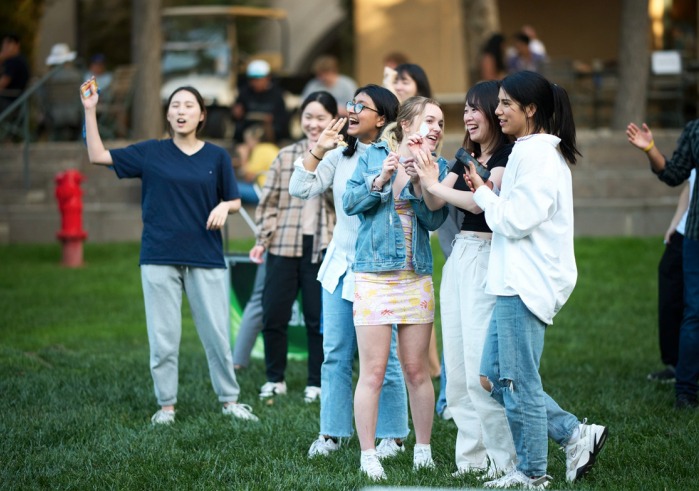SUA Begins a New Tradition to Celebrate its 21st Birthday

Coming together to celebrate SUA’s 21st birthday on May 6 felt especially joyful after two years of pandemic restrictions. It was an ideal moment to find a new way to mark the anniversary and showcase the power of community.
The vibrancy of the SUA family was the theme of a celebration that drew about 300 students, faculty, and staff. Guests heard from campus leaders, alumni, and keynote speaker Ceasar McDowell before they filled the campus green to enjoy conversations, games, and food trucks serving cuisines from around the world.
“After the remote study and telework period ended, we wanted to find a new tradition to celebrate SUA’s birthday,” said President Edward Feasel, after thanking some of the university leaders who planned the day’s events. “I hope this tradition of dialogue and community building will help us actualize the university’s mission.”
Following Pres. Feasel’s remarks, alumni from around the world shared their reflections on video about the values they learned at Soka, including resilience, diversity, and caring, and how those values inform their lives today.
Jenny Cook ’11 said she learned the importance of compassion through the “most incredible heart-to-heart dialogues” she had while on campus. As a learning behavior specialist in Chicago, it is something she relies on daily as she works with students of diverse backgrounds to bring equity to her practice.
Dane Niemczura ’18 recalled the sincere and genuine caring he experienced on campus, and that the true expression of the values of global citizenship is “how we treat the person in front of us.”
The Nature of Community
To answer the question posed in the title of his talk—“Is Community Possible?”—McDowell, professor of the practice of civic design at MIT’s Department of Urban Studies and Planning and associate director of civic design at the Center for Constructive Communication, began by digging into what it means to be in community.
McDowell, whose work centers on design of civic infrastructures and processes to connect the increasingly demographically complex public, told the audience of about 160 people gathered in the Soka Performing Arts Center and online that the answer begins with refining the idea of community.
McDowell, who is also co-host of WeWhoEngage, a podcast on civic design, referred to Carl Moore’s definition of community as existing when interdependent people “can peacefully struggle with the traditions that bind them and the interests that separate them,” in order to build a better future. Peaceful struggle, he said, is key to that understanding. “To step into differences and own them are not easy things,” McDowell said.
Dialogue is crucial to the process of building community, but technology is changing how we speak to each other. While today’s technology allows for self-expression, it also means we have to confront what others are saying—a condition that can lead to trauma as so many of those online conversations are negative and triggering.
“We are in these spaces in which we are very vulnerable and very sensitive,” McDowell said, and because the online environment is so toxic, participating in it can cause everyone to perpetuate it, even inadvertently.
Noting that SUA is a place where dialogue is prized, McDowell challenged people to really “step into the practice,” and remove themselves from all us-vs.-them thinking. That includes thinking of groups such as faculty, staff, or students as separate, and approaching differences between them with a conflict mindset. “Escalating a problem may provide satisfaction as it helps people feel heard, but it can perpetuate separations,” he said. “You are more than that, more than immediate satisfaction.”
Shifting to thinking in a way that respects both the individual and those in the community in situations may be the true definition of community, and requires people to “step into something where we see self-care as more than just ‘what I need’ right now, but self-care as ‘what we need together.’”
Heart-to-Heart Conversation Is ‘Frontier Work’
Following his talk, small groups gathered outside the Soka Performing Arts Center to reflect on its themes. “What resonated with me the most was what he mentioned about building community with heart-to-heart conversation being frontier work,” said Emi Kuroda ‘23. “I believe that the world needs this type of community building more than ever and it can’t be achieved by repeating the past but by always exploring the potential of community and sincere dialogue starting with the person in front of us.”
Sharing their thoughts in a small group format reinforced the importance of conversation, Kuroda said. “It was really nice and meaningful to see each other and talk in person because I felt a deep sense of community by getting to know more about people such as those who work at different offices on campus showing their care for the students and aspiring to contribute to the world.”
Overall, attendees felt SUA’s birthday party was a success. Yuna Hasegawa ‘25 said they “loved how the event allowed students to connect with the staff who are supporting our college lives and get to know them better as a person through sharing each other’s experiences.”
